Lin Manuel-Miranda, Jon Chu, Anthony Ramos, Melissa Barrera and Leslie Grace on ‘In The Heights’
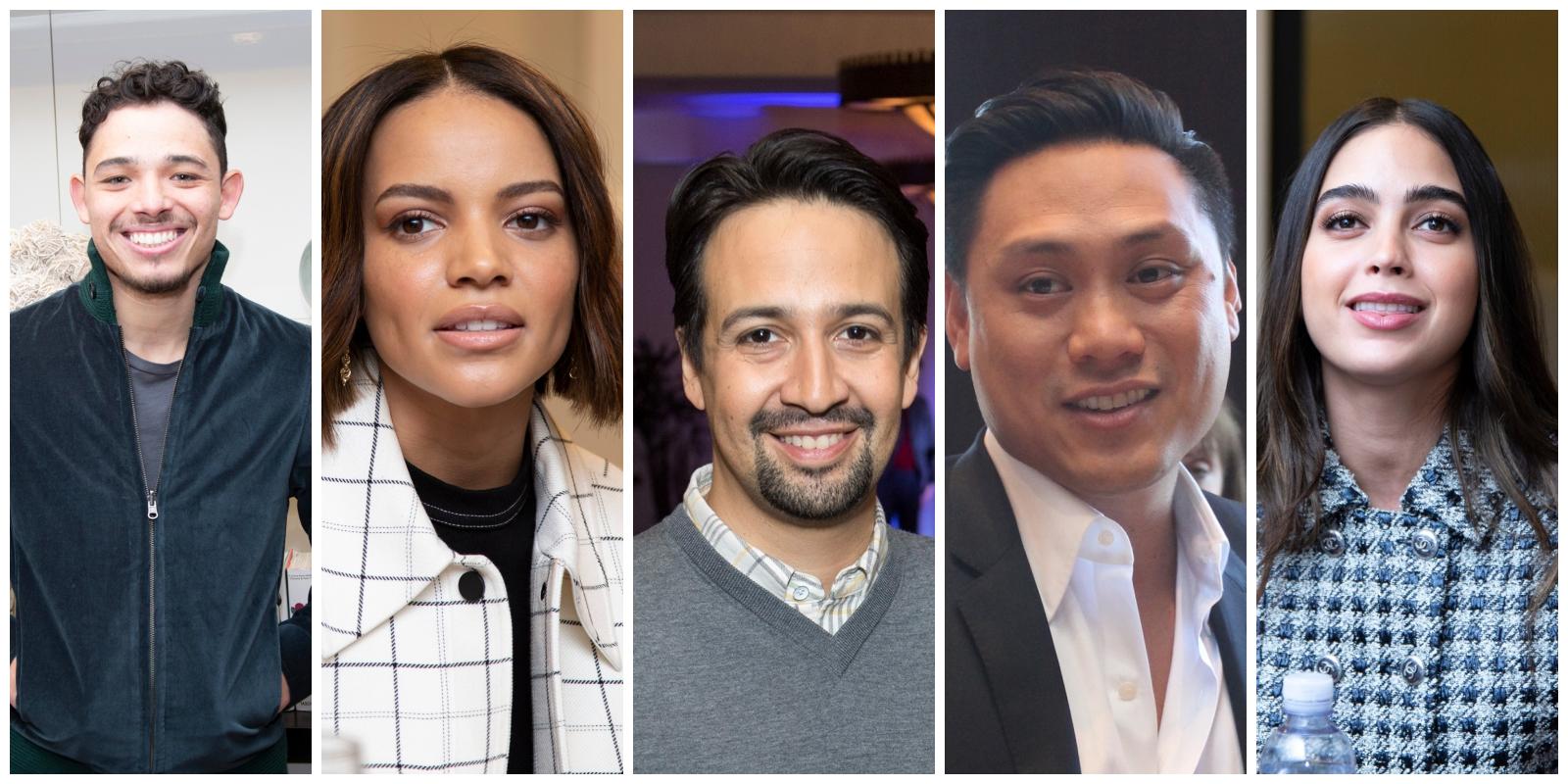
Los Angeles — We were on the set of “In The Heights” and it was interesting watching how young boys and girls did not mind being in a gigantic pool for hours singing and dancing while director Jon Chu, who was also in the pool and wet, directed the kids as if there was nothing unusual in what he was doing.
Creator-writer-producer Lin Manuel-Miranda talked to us and reminisced how he grew up in a similar neighborhood. He gushed about his lead actor, Anthony Ramos who portrays Usnavi de la Vega, and tells us that Anthony played the role better than he did.
The popular Broadway musical, which is now a much-awaited movie, is set in over the course of three days in a largely Dominican neighborhood in Washington Heights in New York City.
We interviewed Jon, Lin, Anthony as well as actresses Melissa Barrera (who portrays Vanessa) and Leslie Grace (who portrays Nina). Below are excerpts of our conversations with them:
Lin Manuel-Miranda (writer-producer)
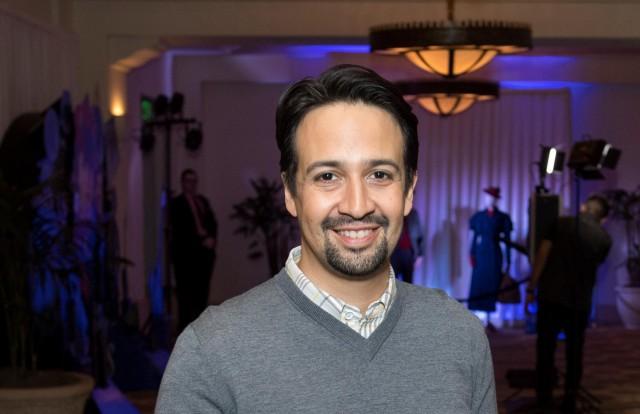
Obviously, the afterlife of a theatrical experience is the movie version. Can you talk about that?
What’s remarkable is, now we are 11 years since “Heights” opened on Broadway. This lives in a different place in people’s hearts now. This is not like the hot new show that just opened.
I can’t tell you how many extras out there played salon ladies in a school production of the show, or “Heights” was their first Broadway show. And so there have been so many school productions, regional productions — it just lives in a different place for people now.
So even though we have been throwing our hands up at the many twists and turns with the film version. It feels so right that it’s happening now. We feel so lucky that Jon Chu is directing.
Did you have any requirements for the film version? It could go in so many different directions.
Yeah, we had a dream checklist. We wanted to film it in this neighborhood and here we are. We both can walk to work from here. We both live up here. And we really wanted it to be a love letter to this neighborhood.
I can tell you some of those earlier versions, they were not trying to film up here because it’s expensive to film in New York. We have a diverse array of actors and we do not need to worry about a big international star but the best people for the part. And it’s been thrilling to actually be able to do that.
Was your cameo in the movie planned or did it happen organically?
It's funny, I'll confess: I was dragged kicking and screaming into it. I really felt like I did my best to make the best stage production. It's Jon's job to make the best movie. And I wanted him to have full ownership of the success of that. And then as it got, and he was like, alright brother, see you on set. Sure. And then as we got closer and I saw what he was building in rehearsal in preproduction, it finally hit me. Like, I'm crazy not to be in this movie.
And actually, Quiara (Alegria Hudes, writer-producer) is the one who said, 'if you didn't write this, you'd be begging to be in it. What the hell is the holdup?'
So, I finally embraced it, and I'm so glad I did. I got to have so many special moments, on-screen, especially with Anthony Ramos, who plays Usnavi (de la Vega) better than I ever did. And so, it was a joy to play a role, adjacent to the one I played. And it really feels like passing the torch in a very real way as a result.
What would you do if you won the lottery? You have this song titled “96,000 Dollars.”
I would invest it back in the neighborhood actually. What’s really interesting is we have so many roots in this neighborhood, in this area now, the holding area for our actors is the United Palace Theater where I have invested a lot of my money personally in rebuilding the cinema.
I bought the HD projector for them. I helped them buy a new screen so that we have a nice movie palace in Washington Heights.
You were only 28 years old when you won a Tony for this. Was this part of your dream to have a movie about “In The Heights?”
“In the Heights” has always wanted to be bigger than it had any right to be. Even when it was an 80-minute one-act play when I wrote it when I was 19 years old at Wesleyan University. I had to cast a really wide net because I went to a school without a lot of Latino kids.
So my audition sheets went higher and farther than all the other audition sheets so I could get the cast to perform the show. And as a result, everyone at school had a friend in the play. (laughs) And that’s why we were a hit play on campus.
And then as I was working on it with Tommy Kail, the director of the stage version, it felt bigger than me, and Quiara came on in 2004 and she started taking ownership of the libretto and it started becoming a community. It was more about Rosario and it became about this neighborhood as soon as Quiara came on board.
And so again the show, it’s like alright, we are too big for off-Broadway, we are not really making money off-Broadway, but we have to go on Broadway to live. Then we were very lucky to find a life and success with the Tony in 2008. And now here is this movie. It doesn’t want to be a tiny little indie movie. It wants to be a giant production number in a high-pitched pool.
I don’t know if you heard this, but there was a local production of the “Heights” at George Washington High School, which is literally 15 blocks up that way. And those kids were amazing. We went to see them and they are there in the pool right now. They are like the luckiest school production ever because they live here. But they have been in the pool and in the scenes all day, so it really is about embracing the totality.
You can get it in such a bigger way on film than you can on stage and you are limited by the athleticism it takes to do eight shows a week. But here we get to put the whole community into the movie.
Are there new songs in the movie?
There are no new songs in the movie. I think I am writing a new song for the closing credits, but there will be no new songs in the movie mainly because you always had to cut songs for the film adaptation and we just wanted to use all of our real estate to get as many of the fans’ favorite songs in as possible.
We are like why am I going to make up a situation to write about as opposed to just tell the story we are already telling. That being said, it’s hard to choose.
In your words, can you tell what the story is at its heart?
This is a show about home. And it’s a show and that’s a loaded word if your parents were born someplace else. And it’s a loaded word if you are an immigrant or the child of an immigrant.
The stage show was about three days in the life of this immigrant community. This is about a Summer. I would say the movie opens itself up to about a Summer in the life of this community called Washington Heights New York and people are from all over.
If “Fiddler on the Roof,” the word you can wrap that whole movie up about is “tradition,” and what happens when those traditions begin to break down. And which traditions do we hold onto and which traditions can we let go? Well our thinking with “In the Heights” is, okay so we’ve all come to America from all over the world, and our parents have made that sacrifice or our grandparents have made that sacrifice so we can start a new life here, what traditions can we hold onto, what traditions do we let go of?
Jon Chu (director)
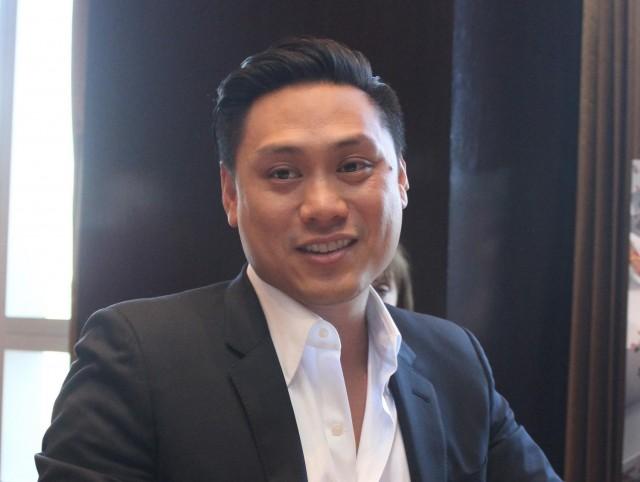
Is there any difference directing “Crazy Rich Asians” and now Latin people with that kind of rhythm?
That kind of rhythm, yes. 100%. I was a listener on this one. I was also a listener on “Crazy Rich Asians." I didn’t know a lot about going to Singapore and all those things, but I knew what it felt like as an Asian-American going to Asia for the first time.
And this one, I did not grow up in Washington Heights. I’m not from the Latino community. So, for me, he was an amazing guy. Quiara was an amazing guide, and it was like when I first started working with dancers, a lot of people think I’m a dancer, I’m not a dancer. I just love hanging out with them. And they were the ones who would help me.
When I was a kid, I got to know them and why they were dancing and why these moves meant something. It wasn’t just a flip, and it was because it came from a necessity to express something in the same way I approached this.
I wanted to understand why these songs get written to be in those spaces to then shoot in those spaces about a dispatch that was on the corner. I got to learn a lot. I got to use my skill sets as a filmmaker to then express those things from the inside out. I never tried to impose outside itself. I think the audience will appreciate my view as an outsider in all the things that I got to witness for the first time when we’d argue about what sauces would be on the dinner table, or how you would serve.
People would be sitting on the floor; they’d be sitting on the staircase. The type of apartment they would be in. They’d have that sauce, but then someone would make a homemade version and put it in their back pocket and bring it out and stuff. To me those details were everything and we made room for it. So when we’re shooting a scene, we gave plenty of space for actors to say, no, that does not feel authentic, we stop and pay attention and say, okay, let’s take the time to figure that out.
So, it’s making space for the details that maybe sometimes you don’t stop. So, I understood the importance. I learned a lot of lessons from “Crazy Rich Asians” that those things are the most important. Authenticity is like an overused word, but truth, when you know, people from the neighborhood, I get to look them in the eye and say, does this feel like this is a dinner you would go to? And when they say absolutely 100%, then you know, you’re on the right track.
What is your history with musicals?
I grew up going to musicals every weekend. I grew up in the Bay Area and my parents would take us to San Francisco for either opera season, ballet season, or musical season. So, I was a big fan of musicals growing up.
They didn't do this consciously, but all my films growing up were music driven and are actually musicals. The student short that I did, called “When the Kids are Away” was my calling card, as they call it, into the business. It’s what Steven Spielberg saw that got me in. That was a musical. So it's been a long time coming.
I always thought musicals was like my dream. I was attached to “Bye Bye Birdie” for my first project back in the day, pay or play. We never made it but I was 23 years old at Sony. I thought it was going to be my first movie. We spent two years developing that and ultimately never made it. This was 2002, 2003 something like that. And then I wanted to find the right musical. And this one just had all the elements that I felt it's time to do it. And I've done a lot of stuff with dancers over the years. Our “Legion of Extraordinary Dances” was this online dance series.
Are there any musical homages?
We have lots. We have Fred Astaire, Ginger Rogers stuff on the bench. Michael Jackson. Even music videos that I grew up with. All those things. Whoever expresses themselves in music and dance, that’s what we have drawn from. So the show itself has a lot of homages from “Rent” to Disney musicals, all those things.
Anthony Ramos (Usnavi de la Vega) and Melissa Barrera (Vanessa)
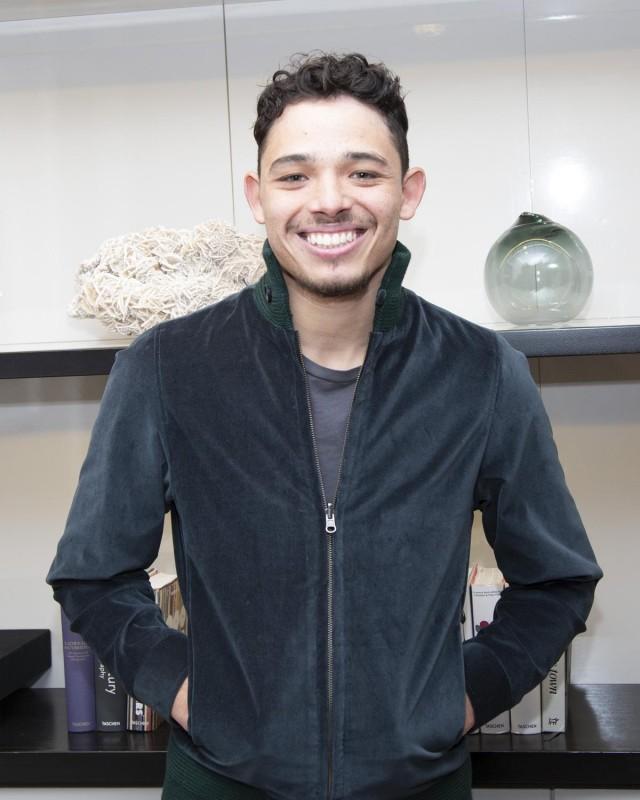
How was your experience doing the musical?
Anthony: I tell people all the time, it was one of the greatest experiences of my life. Probably the most amazing moment of my life, the five months making this movie.
I love telling this story because my mom is in the movie, my sister is in the movie. Never in a million years would I have thought I could be on the big screen with my mother, and my sister. My mom is like the star of this movie now. Now she's asking me about her checks (laughter) I'm like, mom, I don't know when your check's coming, I’m sorry. This movie is about community families, about all of those things. And it doesn't get more real than that. You know what I mean? Being in Washington Heights with my mom.
Melissa: Every expectation that I had, and I had big expectations going into it because I'm a huge fan of the musical — I saw it like 15 times on Broadway. I auditioned for it all the time when it was on Broadway. Never got a call back, nothing.
(laughter) Ten years later... But it was like, sometimes when you idealize something so much then you get disappointed because you know you have like these super high expectations and like reality sometimes in this industry is that it's a struggle and like you run into things and it's not as nice as you think it's going to be.
This was a literal dream, from beginning to end, some panic attacks along the way. Panic attacks during rehearsals. But like crying in the bathroom because I couldn't get the choreography, but I had to get through that hurdle. And it was just an amazing experience.
Anthony, you have done theater. How was singing here to singing on stage?
Anthony: Well Lin was on the set a lot. But Lin was very selective about what notes he gave. He wasn't always like in someone's ear like, “we gotta to change that.” It was like, he's very selective about what adjustments he wanted to make. I didn't actually think we were going to do anything live. But Jon, we did a lot live.
Lin told us you played the role better than he could. What was the impetus of you getting the role?
Anthony: The journey to this role has been a long one and it's wild. I auditioned for this musical when I was 19, and for the non-union national tour of “In the Heights.” This was a bus and truck tour. Right? I didn't get it. I did four auditions; I didn't get it.
Years later, I had no agent. Boom, “Hamilton” happens. I just went into an open call and it was crazy. Couldn't believe that that happened to me. It's 2019 when we shot this.
So, Lin and I had created this, we've been friends for a while now, but never in a million years did I think they were gonna pick me for this role. I was like they’re going to pick whoever, some star, I don't know.
But I did a performance of this, seven performances at the Kennedy Center in Washington, D.C. and what was wild was the dude that was supposed to play Usnavi got hurt. He was on tour doing a different show and right before he was supposed to come to rehearse for this show at the Kennedy Center, he gets hurt and I get a call from Stephanie Klemons was the associate choreographer on “Hamilton.” She also worked on, “In the Heights,” she was in the original cast. She was directing this iteration. She calls me, she's like, “Hey, we need somebody like tomorrow to play Usnavi in our production at the Kennedy Center.” I said tomorrow? I'm like, well, gee. She's like, can you be here, my manager’s here. She'll tell you. We were texting each other, we got to answer him back within the next like four hours.
And I said, you know what, I'm just going to take a leap and do it. And Lin came and saw the show and Lin wrote this tweet that was crazy. He said something like, it's like seeing your kid. It's like you pretend you're a tap dancer. You've been tapping your whole life, then you put your tap shoes away, up on the top shelf of the closet, and all of a sudden you hear your kid one day, you're just downstairs and you're doing whatever, and all of a sudden you hear tap dancing coming from the top floor and you're like, what is that? And you see your kid and he took your tap shoes and they fit him better than they ever fit you. And he taps more beautifully than you would've ever imagined. And you realize that those shoes were never even for you. They were for him. And I read this tweet and after reading that I met Jon Chu here in LA, and we had breakfast and we were just sharing stories. And Jon is tearing up and I'm tearing up and I'm like, alright I buy, I got to go.
After you’ve been trying to get into “In The Heights,” you’ve probably watched it many times. What did you discover about the play once you were in it that you didn’t see from the stage?
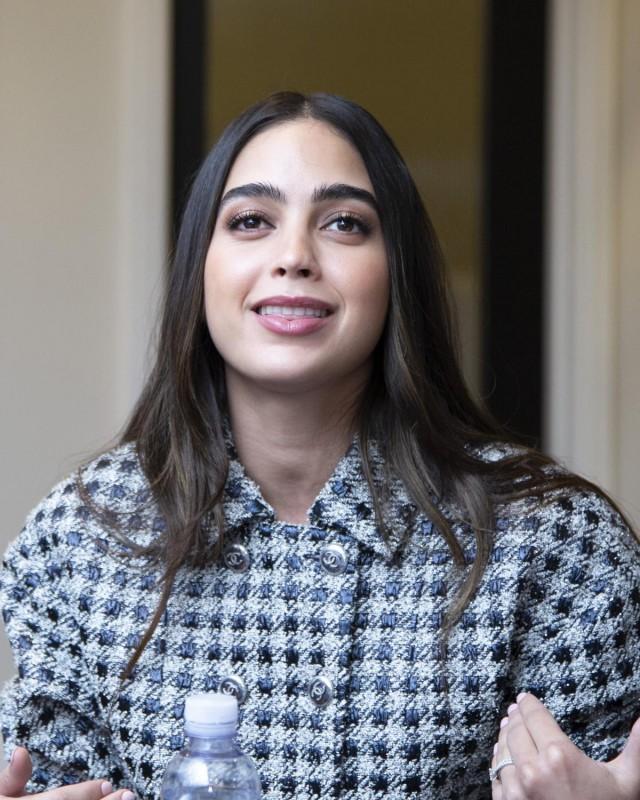
Melissa: I think when I watched it, I thought then what I felt was because of my experience and the connection that I felt with it was because for the first time I was seeing people that looked like me on stage and I could clearly see myself getting into this show and playing one of these roles on Broadway. I thought I'm emotional because of that. And I didn't think all the songs are all so upbeat and they're like, so happy most of them. This probably doesn't affect people the way that it affected me. When we did this movie, I realized that there's so much heart in the story, it's going to destroy people no matter where they're from, no matter what country, no matter the color of their skin, no matter their background.
They're gonna connect with these people and their dreams and their struggles and the love that they find in their community. It was a beautiful thing to realize. It was a beautiful thing to live on set every day.
Anthony: This movie showed me how much I needed this. I didn't realize how much I needed this movie. I didn't realize how much I needed to act alongside someone like Melissa. I didn't realize that I needed to sing words and music that felt familiar to me and the way I grew up. Because I've just have never seen it, on the big screen in Hollywood. I've never seen that. I've never seen 75 people of Latin descent dancing in the middle of the street in the barrio. I've never seen that. And shooting this movie made me realize how much I needed that. How much I needed to see that because it just inspired me. It dialed me up even more. Like how can I tell more story? How can we contribute to this? How can we take this even further after this movie?
Lin said that rap has so many more words per measure than any other art form. How do you prep for a role like this?
Anthony: You just listen to Biggie Smalls. I grew up listening to, “Get rich or die trying,” Marshall Mathers, Eminem like these are all like top albums in my life. I'm seven years old, my CD player saying words I probably shouldn't be saying at seven in front of my mother and she's yanking the CD player from me. And I'm like ma, I was in it, I was on track seven. What are you doing?
But rapping is not easy, but I'm grateful that hip hop has been a part of the rhythm of my life. I grew up listening to hip hop. I still listen to hip hop. Like, I rap in on my album. That's, just the way I know how to express myself. And sometimes when you feel like you can't say as much as you'd like to in a regular melody, in like a singing melody, sometimes you need a rap. Shakespeare rapped. If you think Shakespeare is not rap, you, pentameter. That's ten syllables. He spoke in verse and prose. That's rap. We've been rapping since the dawn of time. So, I think that's what's so beautiful about it. I'm so grateful that this was the way that we told this story. Not everybody's rapping all the time, right? I'm really grateful that this was the way we told the story. With music that feels like now.
Leslie Grace (Nina)
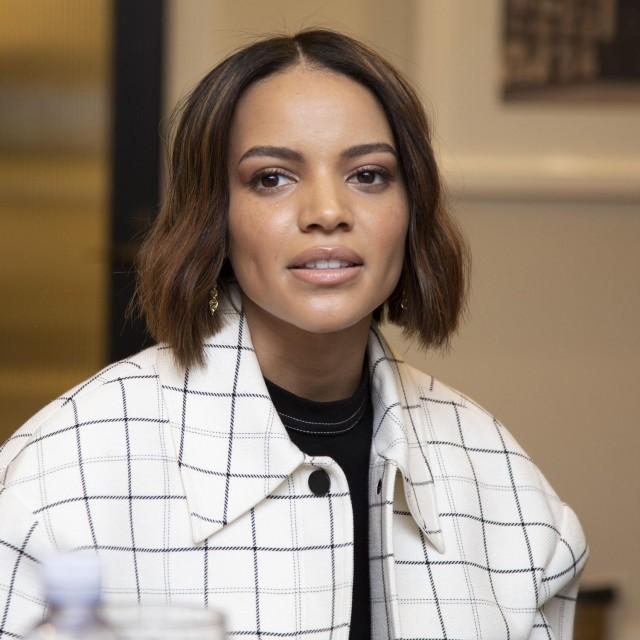
Talk about the importance of a story like this and why you think now is the moment that this movie can happen.
I think that it's beautiful to see a story like this put on such a high platform. It's very rare sadly to see the people that you see in this film play these glorified roles, these glorified stories and that's what's beautiful even outside of the beautiful piece of art that we all made together and that, hopefully everybody will enjoy when they see in the theatre.
I think the story that comes out even further than that is the fact that that was even able to be made like that's Lin's story, Quiara's story, their journey to getting this to happen, the overall statement of this project even being possible is a story in and of itself and we hope that, in the same way that when Lin brought this onto Broadway and this was like revolutionary for Broadway seeing people of all colors onstage and seeing contemporary music being done on Broadway too for the first time that – I hope that that does that, this does that for film and that we'll be able to see more stories like this done in the way that we came together to do this. — LA, GMA News



